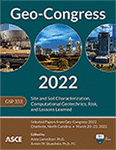Stochastic Stratigraphic Simulation and Uncertainty Quantification Using Machine Learning
Publication: Geo-Congress 2022
ABSTRACT
The Annex D in the latest edition of the international standard General Principles on Reliability for Structures (ISO2394:2015) recognizes that the geotechnical reliability-based design should place site investigation and the interpretation of site conditions as the cornerstone of the methodology. The geotechnical reliability analysis is sound only when the source uncertainty—the interpretation of site conditions—is well quantified. It is a consensus that probabilistic subsurface stratification is still an open question in geotechnical engineering. The gap lies in the difficulty of developing an uncertainty-aware integration of subjective engineering judgment and the sparse objective site exploration data. In this investigation, a stratigraphic uncertainty quantification approach is developed by integrating the Markov random field (MRF) model and the discriminant adaptive nearest neighbor-based k-harmonic mean distance (DANN-KHMD) classifier into a Bayesian framework. To demonstrate the effectiveness, both synthetic and real-world examples are illustrated.
Get full access to this article
View all available purchase options and get full access to this chapter.
REFERENCES
Besag, J. (1986). On the statistical analysis of dirty pictures. Journal of the Royal Statistical Society: Series B (Methodological), 48(3), 259–279.
Cross, G. R., and Jain, A. K. (1983). Markov random field texture models. IEEE Transactions on Pattern Analysis and Machine Intelligence, (1), 25–39.
Daly, C. (2005). Higher order models using entropy, Markov random fields and sequential simulation. In Geostatistics Banff 2004 (pp. 215–224). Springer, Dordrecht.
Fadlelmula, M. M., Akin, S., and Duzgun, S. (2014). Parameterization of Channelized Training Images: A Novel Approach for Multiple-Point Simulations of Fluvial Reservoirs. In Mathematics of Planet Earth (pp. 557–560). Springer, Berlin, Heidelberg.
Fenton, G. A. (1999). Estimation for stochastic soil models. Journal of Geotechnical and Geoenvironmental Engineering, 125(6), 470–485.
Geman, S., and Geman, D. (1984). Stochastic relaxation, Gibbs distributions, and the Bayesian restoration of images. IEEE Transactions on pattern analysis and machine intelligence, (6), 721–741.
Gong, W., Tang, H., Wang, H., Wang, X., and Juang, C. H. (2019). Probabilistic analysis and design of stabilizing piles in slope considering stratigraphic uncertainty. Engineering Geology, 259, 105162.
Gong, W., Zhao, C., Juang, C. H., Tang, H., Wang, H., and Hu, X. (2020). Stratigraphic uncertainty modelling with random field approach. Computers and Geotechnics, 125, 103681.
Hastie, T., and Tibshirani, R. (1996). Discriminant adaptive nearest neighbor classification. IEEE transactions on pattern analysis and machine intelligence, 18(6), 607–616.
Koller, D., and Friedman, N. (2009). Probabilistic graphical models: principles and techniques. MIT press.
Miranda, T., Correia, A. G., and e Sousa, L. R. (2009). Bayesian methodology for updating geomechanical parameters and uncertainty quantification. International Journal of Rock Mechanics and Mining Sciences, 46(7), 1144–1153.
Norberg, T., Rosén, L., Baran, A., and Baran, S. (2002). On modelling discrete geological structures as Markov random fields. Mathematical Geology, 34(1), 63–77.
Pan, Z., Wang, Y., and Ku, W. (2017). A new k-harmonic nearest neighbor classifier based on the multi-local means. Expert Systems with Applications, 67, 115–125.
Qi, X. H., Li, D. Q., Phoon, K. K., Cao, Z. J., and Tang, X. S. (2016). Simulation of geologic uncertainty using coupled Markov chain. Engineering geology, 207, 129–140.
Wang, H., Wang, X., Wellmann, J. F., and Liang, R. Y. (2019a). A Bayesian unsupervised learning approach for identifying soil stratification using cone penetration data. Canadian Geotechnical Journal, 56(8), 1184–1205.
Wang, H., Wellmann, J. F., Li, Z., Wang, X., and Liang, R. Y. (2017). A segmentation approach for stochastic geological modeling using hidden Markov random fields. Mathematical Geosciences, 49(2), 145–177.
Wang, X., Li, Z., Wang, H., Rong, Q., and Liang, R. Y. (2016). Probabilistic analysis of shield-driven tunnel in multiple strata considering stratigraphic uncertainty. Structural safety, 62, 88–100.
Wang, X., Wang, H., and Liang, R. Y. (2018). A method for slope stability analysis considering subsurface stratigraphic uncertainty. Landslides, 15(5), 925–936.
Wang, X., Wang, H., Liang, R. Y., and Liu, Y. (2019b). A semi-supervised clustering-based approach for stratification identification using borehole and cone penetration test data. Engineering Geology, 248, 102–116.
Information & Authors
Information
Published In
History
Published online: Mar 17, 2022
Authors
Metrics & Citations
Metrics
Citations
Download citation
If you have the appropriate software installed, you can download article citation data to the citation manager of your choice. Simply select your manager software from the list below and click Download.
